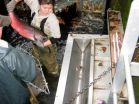(Press-News.org) As part of a series of experiments designed to resolve one of the deepest mysteries of physics today, researchers from RIKEN, in collaboration with the University of Mainz, GSI Darmstadt and the Max Planck Institute for Physics at Heidelberg, have made the most precise ever direct measurement of the magnetic moment of a proton.
The work, published in Nature today, seeks to answer the fundamental question of why we exist at all. It is believed that the Big Bang some 13 billion years ago generated equal amounts of matter and antimatter-which annihilate when they collide-and yet the universe today seems to contain only matter. Work is being carried out from many fronts to detect differences that would explain this, and one promising route is to compare the magnetic moments of particles and their antimatter conjugates, as even a tiny difference could explain the matter-antimatter asymmetry. The research collaboration is working to measure the magnetic moment of the proton and antiproton to unprecedented precision, and determine if there is any difference.
In the study published today, the researchers reached an important milestone by directly measuring the moment of a single proton to enormous precision, based on spectroscopy of a single particle in a Penning trap. Andreas Mooser, first author of the paper, explains that "this important quantity has never been measured directly and is so far only known at a relative precision of about 10 parts per billion, based on hyperfine spectroscopy of a MASER in a magnetic field. However, this required significant theoretical corrections to extract the proton's magnetic moment from the measurement." In the new paper the researchers report the first direct high precision measurement of the proton magnetic moment at a fractional precision of 3 parts per billion, improving the 42-year-old "fundamental constant" by a factor of three.
The new method using a single particle in a Penning trap can now be directly applied to measure the magnetic moment of the antiproton, which is currently known at a relative precision of only 4 parts per million.
According to RIKEN researcher Stefan Ulmer, second author of the paper and spokesperson of the BASE collaboration at CERN which aims at the high precision measurement of the antiproton moment, "Using the new method will allow this value to be improved by at least a factor of thousand, providing a stringent test of matter -antimatter symmetry."
INFORMATION: END
Zeroing in on the proton's magnetic moment
2014-05-28
ELSE PRESS RELEASES FROM THIS DATE:
Extensive cataloging of human proteins uncovers 193 never known to exist
2014-05-28
Striving for the protein equivalent of the Human Genome Project, an international team of researchers has created an initial catalog of the human "proteome," or all of the proteins in the human body. In total, using 30 different human tissues, the team identified proteins encoded by 17,294 genes, which is about 84 percent of all of the genes in the human genome predicted to encode proteins.
In a summary of the effort, to be published May 29 in the journal Nature, the team also reports the identification of 193 novel proteins that came from regions of the genome not predicted ...
New study finds Antarctic Ice Sheet unstable at end of last ice age
2014-05-28
CORVALLIS, Ore. – A new study has found that the Antarctic Ice Sheet began melting about 5,000 years earlier than previously thought coming out of the last ice age – and that shrinkage of the vast ice sheet accelerated during eight distinct episodes, causing rapid sea level rise.
The international study, funded in part by the National Science Foundation, is particularly important coming on the heels of recent studies that suggest destabilization of part of the West Antarctic Ice Sheet has begun.
Results of this latest study are being published this week in the journal ...
Major discovery on the mechanism of drug resistance in leukemia and other cancers
2014-05-28
A mechanism that enables the development of resistance to Acute Myeloid Leukemia (AML) anticancer drugs, thereby leading to relapse, has been identified by Kathy Borden of the University of Montreal's Institute for Research in Immunology and Cancer (IRIC) and her collaborators. Kathy Borden is a Principal Investigator at IRIC and a professor at the university's Department of Pathology and Cell Biology. The development of drug resistance is one of the main problems in clinical oncology and the cause of relapse in many patients.
The new discovery, recently published in ...
NASA's TRMM and Aqua satellites peer into Tropical Storm Amanda
2014-05-28
Hurricane Amanda has weakened to a tropical storm, but not before NASA's TRMM satellite took a look under its clouds at the rate of heavy rainfall it was generating. After weakening to a tropical storm, NASA's Aqua satellite identified that those strong thunderstorms were limited to the area around the center of its circulation.
The Tropical Rainfall Measuring Mission satellite known as TRMM passed over Amanda on Saturday May 24, 2014 at 2150 UTC (5:50 p.m. EDT). TRMM is a joint mission between NASA and the Japan Aerospace Exploration Agency known as JAXA.
At NASA's ...
Wild coho may seek genetic diversity in mate choice
2014-05-28
CORVALLIS, Ore. – A new study by researchers at Oregon State University suggests that wild coho salmon that choose mates with disease-resistant genes different from their own are more likely to produce greater numbers of adult offspring returning to the river some three years later.
The researchers also found that hatchery-reared coho – for some unknown reason – do not appear to have the same ability to select mates that are genetically diverse, which may, in part, explain their comparative lower reproductive success.
Results of the study have been published in this ...
Increased social network can have big payoff for nonprofits, study shows
2014-05-28
BUFFALO, N.Y. — Charitable fundraising once depended primarily upon a charity's size, efficiency and longstanding reputation. That was before Razoo, Chipin, Facebook and Twitter came to town.
In the first academic study to look at what determines charitable giving on social-media sites, researchers found that those media have created a more level playing field in the nonprofit world, one in which successful use of technology can make up for limited organizational size.
Technology and social media, it turns out, can not only raise the online profile of even small organizations, ...
How long should HCV treatment last? Study suggests answers are complex
2014-05-28
BUFFALO, N.Y. – As new treatments for hepatitis C virus (HCV) are approved, biomedical scientists are exploring their mechanisms and what they reveal about the virus. An online publication this month in Hepatology is the first to report real-time tracking of viral decay in the liver and blood in 15 patients with HCV.
Led by Andrew H. Talal, MD, University at Buffalo professor of medicine in the Division of Gastroenterology, Hepatology and Nutrition and corresponding author, the study is the first to trace in real-time how the drug telaprevir inhibits viral replication ...
Study affirms value of epigenetic test for markers of prostate cancer
2014-05-28
A multicenter team of researchers report that a commercial test designed to rule out the presence of genetic biomarkers of prostate cancer may be accurate enough to exclude the need for repeat prostate biopsies in many — if not most — men.
"Often, one biopsy is not enough to definitively rule out prostate cancer," says study researcher Jonathan Epstein, M.D., director of the Division of Surgical Pathology and a professor of pathology, urology and oncology at the Johns Hopkins University School of Medicine. "Our research finds that by looking for the presence or absence ...
Women's contraceptive use influenced by contraception education and moral attitudes
2014-05-28
COLUMBIA, Mo. – Nearly half of all pregnancies in the United States are unintended, and unplanned pregnancies are associated with poorer health and lower rates of educational and economic achievement for women and their children, according to the Centers for Disease Control and Prevention. However, research shows that the desire to avoid pregnancy does not necessarily increase women's use of contraceptives, although this discrepancy is not well understood. Now, MU researchers have found that levels of prior sex education and moral attitudes toward contraception influence ...
Toxins in the environment might make you older than your years
2014-05-28
Why are some 75-year-olds downright spry while others can barely get around? Part of the explanation, say researchers writing in the Cell Press journal Trends in Molecular Medicine on May 28, is differences from one person to the next in exposure to harmful substances in the environment, chemicals such as benzene, cigarette smoke, and even stress.
While the birth date on your driver's license can tell you your chronological age, that might mean little in terms of the biological age of your body and cells. The researchers say that what we need now is a better understanding ...




